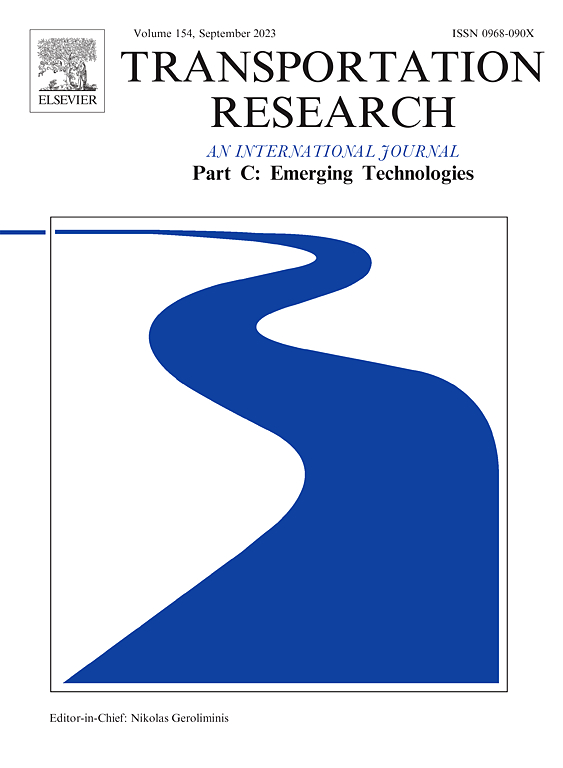考虑不确定性的第一和最后一英里预订服务的模块化电力装置
IF 7.6
1区 工程技术
Q1 TRANSPORTATION SCIENCE & TECHNOLOGY
Transportation Research Part C-Emerging Technologies
Pub Date : 2025-04-23
DOI:10.1016/j.trc.2025.105127
引用次数: 0
摘要
本研究探讨了提供基于预订的第一和最后一英里服务(FLMRS)的模块化电动单元(meu)车队的日前管理。考虑到有限的机队资源,运营商寻求战略性地选择请求,接受并部署最优的MEU配置,以最大限度地提高服务收益。这个过程包括预先确定MEU配置和旅行行程,包括路线和收费计划,并向乘客提供及时的反馈。此外,操作环境是可变的,受不确定的拥塞水平的影响,请求信息随着时间的推移而出现。因此,FLMRS问题被建模为一个随机的、时变的、动态的路由问题,用半马尔可夫决策过程(SMDP)来表述。为了解决这个问题,我们开发了一种多智能体深度分层强化学习(MADHRL)方法,通过重塑奖励函数来求解分布式SMDP模型。针对不同电池电量的异构MEU,引入了定制化的MEU装配规则,以管理智能体之间复杂的交互,减少其动作空间。平均场舰队状态表示有助于减轻维度的诅咒。此外,考虑到乘客耐心时间的分布,采用了可调整的滚动地平线策略来平衡潜在的请求取消和有利可图的请求收集之间的权衡。基于新加坡真实世界数据的大量数值实验验证了我们方法的有效性。研究结果为有效的运力管理提供了见解,包括针对请求接受和响应时间控制的最佳MEU组合,表明与没有装配操作的传统车辆相比,MEU车队的服务利润增加了3.22%。本文章由计算机程序翻译,如有差异,请以英文原文为准。
Modular electric units for first-and-last-mile reservation services considering uncertainty
This study explores the day-ahead management of a fleet of modular electric units (MEUs) providing reservation-based first-and-last-mile services (FLMRS). Given limited fleet resources, the operator seeks to strategically select requests to accept and deploy optimal MEU configurations, aiming to maximize service revenue. This process involves pre-determining MEU configurations and travel itineraries, including routing and charging plans, and providing passengers with timely feedback. Furthermore, the operational environment is variable, affected by uncertain congestion levels, with request information emerging over time. Consequently, the FLMRS problem is modeled as a stochastic, time-dependent, and dynamic routing problem, formulated by a semi-Markov decision process (SMDP). To address this, we develop a multi-agent deep hierarchical reinforcement learning (MADHRL) approach to solve the distributed SMDP model through a reshaped reward function. A tailored MEU assembly rule is introduced to manage complex interactions among agents and reduce the action space for heterogeneous MEUs with varying battery levels. A mean-field fleet state representation helps to mitigate the curse of dimensionality. Additionally, an adjustable rolling-horizon strategy is applied to balance the trade-off between potential request cancellation and profitable request collection, taking into account the distribution of passengers’ patience times. Extensive numerical experiments, based on real-world data from Singapore, validate the efficacy of our methodology. Results offer insights into effective capacity management, including optimal MEU combinations for request acceptance and response timing control, indicating a 3.22% increase in service profit by an MEU fleet compared to traditional vehicles without assembled operations.
求助全文
通过发布文献求助,成功后即可免费获取论文全文。
去求助
来源期刊
CiteScore
15.80
自引率
12.00%
发文量
332
审稿时长
64 days
期刊介绍:
Transportation Research: Part C (TR_C) is dedicated to showcasing high-quality, scholarly research that delves into the development, applications, and implications of transportation systems and emerging technologies. Our focus lies not solely on individual technologies, but rather on their broader implications for the planning, design, operation, control, maintenance, and rehabilitation of transportation systems, services, and components. In essence, the intellectual core of the journal revolves around the transportation aspect rather than the technology itself. We actively encourage the integration of quantitative methods from diverse fields such as operations research, control systems, complex networks, computer science, and artificial intelligence. Join us in exploring the intersection of transportation systems and emerging technologies to drive innovation and progress in the field.

 求助内容:
求助内容: 应助结果提醒方式:
应助结果提醒方式:


